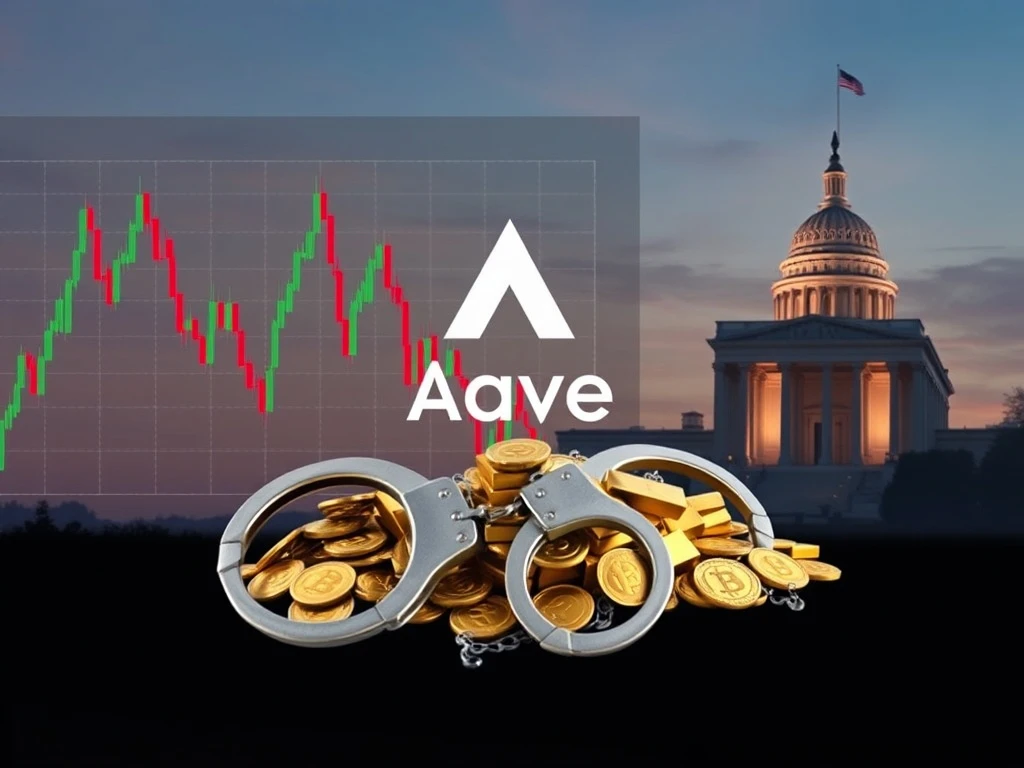Critical Crypto News: Unveiling Today’s Major Market Shifts and Regulatory Challenges

Welcome to your daily briefing on the most significant developments in the digital asset space. Today’s **crypto news** brings a mix of market volatility, enforcement actions, and key regulatory personnel changes. Investors and enthusiasts alike are closely watching these trends. From a notable stumble for the Aave token to a major arrest in a crypto laundering scheme and a significant departure from the IRS’s digital assets division, the landscape continues to evolve rapidly. Understanding these events is crucial for navigating the complex world of blockchain and decentralized finance.
Aave Token Stumbles Amid World Liberty Financial Allocation Rumors
The decentralized finance (**DeFi protocol**) Aave experienced a notable dip this past Saturday. Its native token, **Aave token**, saw a decline of over 8%. This movement followed the circulation of rumors across social media platforms. These rumors suggested a different token allocation from the DeFi platform World Liberty Financial (WLFI).
Blockchain reporter Colin Wu played a role in these developments. He reported that WLFI spokespeople denied news of a specific deal. This denial sent the price of the Aave token tumbling. It fell by over $30 before finding support and rebounding to its current levels. This incident highlights the significant impact of unverified information in the volatile crypto market. Investors often react swiftly to such reports.
A proposal had been submitted to the WLFI community forum in October 2024. This outlined a deal where AaveDAO would receive 7% of WLFI’s circulating supply. Additionally, it proposed 20% of platform revenues from WLFI. Decentralized finance continues to gain prominence. Institutional involvement in the sector is steadily growing. Currently, the total value locked (TVL) within DeFi protocols exceeds $168 billion, according to DeFiLlama. This substantial figure underscores the sector’s increasing maturity and financial significance.
Major Arrest in $50 Million Crypto Laundering Operation
Thai authorities recently apprehended a South Korean national. The 33-year-old man, identified as Han, faces serious charges. He allegedly assisted a call center gang in a massive **crypto laundering** scheme. This operation involved converting over $50 million in cryptocurrencies into gold. Police arrested Han at Bangkok’s Suvarnabhumi Airport on Saturday. A warrant for his arrest had been issued in February, as reported by The Nation.
Han now faces charges of fraud, computer crimes, money laundering, and involvement in a criminal syndicate. This case originated from a large-scale call center scam that began in early 2024. Victims were enticed by fraudulent “investment opportunities.” These opportunities falsely promised extraordinary returns, often between 30% and 50%. Initial payouts were made to create a false sense of security among investors. However, as deposits grew, victims found their withdrawals blocked. The perpetrators claimed investors had failed to meet various requirements.
Dozens of complaints eventually reached the Technology Crime Suppression Division (TCSD). This prompted a comprehensive investigation. The probe has already led to the arrest of ten suspects. These include five alleged money launderers and five individuals holding mule accounts. This incident serves as a stark reminder of the persistent threat of financial crime within the crypto ecosystem. It also highlights the critical role of law enforcement in combating such illicit activities. International cooperation is often essential for addressing these cross-border crimes.
IRS Crypto Division Head Resigns After Three Months
Trish Turner, the head of the United States Internal Revenue Service’s (**IRS crypto**) digital assets division, has resigned. Her departure comes after approximately three months in the role. Turner announced her resignation in a LinkedIn post on Friday. She reflected on her extensive career with the IRS. “After more than 20 years with the IRS, I have closed an extraordinary chapter of my career,” Turner stated. She expressed deep appreciation for those who shaped her journey and made the work meaningful.
Turner further elaborated on her contributions. “Together, we navigated complex challenges, built lasting programs, and laid the groundwork for the IRS’s digital asset strategy,” she added. This strategy has shifted as crypto moved from a niche interest to a mainstream financial topic. Her leadership was instrumental during this transitional period for the agency. The IRS plays a crucial role in establishing clear tax guidelines for digital assets.
Turner did not initially disclose her next professional move in her LinkedIn post. However, she indicated a desire to continue her mission. She aims to build bridges between the industry and regulators. Bloomberg Tax later reported her new position. Turner will become the tax director at Crypto Tax Girl, a prominent crypto tax firm. Laura Walter, the founder of Crypto Tax Girl, confirmed this news on LinkedIn the same day. This move signifies a direct transition of high-level regulatory expertise into the private sector. It also underscores the growing demand for specialized crypto tax services. The continuous evolution of tax policy remains a key area for the digital asset community.
The Evolving Landscape of Crypto News and Regulation
Today’s **crypto news** highlights several critical facets of the digital asset world. The volatility surrounding the **Aave token** and its **DeFi protocol** underscores market sensitivity. Rumors can quickly impact asset prices. Meanwhile, the successful apprehension in the **crypto laundering** case demonstrates increasing law enforcement capabilities. Authorities are adapting to new methods of financial crime. Finally, the resignation of the **IRS crypto** division head indicates ongoing shifts in regulatory oversight. This constant evolution demands vigilance from all participants.
These events collectively paint a picture of an industry undergoing rapid development. It faces both innovation and challenges. Investors must stay informed about market movements. They should also understand the regulatory environment. Lawmakers and agencies worldwide continue to grapple with defining and regulating digital assets. Therefore, staying updated on these developments is not just beneficial, but essential. It helps ensure compliance and informs strategic decisions in the ever-changing crypto market.








